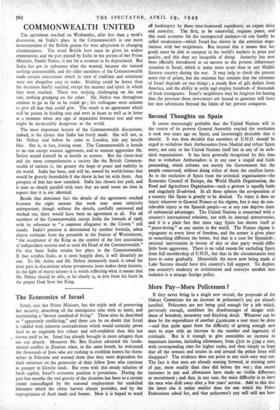COMMONWEALTH UNITED
The agreement reached on Wednesday, after less than a week's discussion, on India's place in the Commonwealth is one more demonstration of the British genius for wise adaptation to changing circumstances. The word British here must be given its widest connotation, and the part played by India in the person of her Prime Minister, Pandit Nehru, is not for a moment to be depreciated. But India has got in substance what she wanted, because she wanted nothing unreasonable, and the older members of the Commonwealth made certain concessions which in view of tradition and sentiment were not altogether easy to make. Nothing could be better than the decisions finally reached, except the manner and spirit in which they were reached. There was nothing challenging on the one side, nothing grudging on the other. Mr.,Nehru was throughout anxious to go as far as he could go ; his colleagues were anxious . to give all that they could give. The result is an agreement which will be potent in binding east and west in heart as well as in letter at a moment when any sign of separation between east and west might be incalculably dangerous to the world.
The most important feature of the Commonwealth discussions, indeed, is the choice that India has freely made. She will not, as Mr. Nehru said before he came to London, join any hostile bloc. She is, in fact, joining none. The Commonwealth is hostile to no one except wanton aggressors, and to wanton aggression Mr. Nehru would himself be as hostile as anyone. But the closer-knit and the more comprehensive a society like the British Common- wealth of nations is, the greater the hope of peace and stability in the world. India has been, and will be, wooed by world-forces that would be gravely formidable if she threw in her lot with them. Any prospect of that has now vanished. India has chosen her path, and it runs so closely parallel with ours that we need waste no time in regrets that it is not identical.
Beside that dominant fact the details of the agreement reached between the eight nations this week may seem relatively unimportant, though without the details, carefully canvassed and worked out, there would have been no agreement at all. For all members of the Commonwealth except India the formula of 1926, with its reference to " a common allegiance to the Crown " still stands. India's position is determined by another formula, taken almost verbatim from the preamble to the Statute of Westminster, " the acceptance of the King as the symbol of the free association of independent nations and as such the Head of the Commonwealth." On that basis India retains her place in the Commonwealth. If that satisfies India, as it most happily does, it will dissatisfy no one. To Mr. Attlee and Mr. Nehru immensely much is owed for their part-in discussions whose prosperous issue makes them historic. In the light of recent history it is worth reflecting what it means that Mr. Nehru should be able, as he clearly is, to join from his heart in the prayer God Save the King.


































 Previous page
Previous page